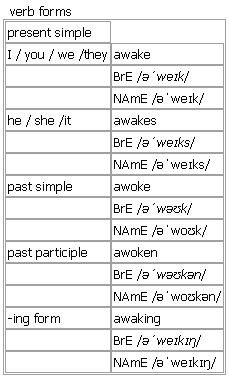|
Từ điển Oxford Advanced Learner 8th
 awake
awake

awake [awake awakes awoke awaking awoken] adjective, verb BrE [əˈweɪk] NAmE [əˈweɪk]
adjective not before noun
not asleep (especially immediately before or after sleeping)
•to be half/fully awake
•to be wide awake (= fully awake)
• I was still awake when he came to bed.
• The noise was keeping everyone awake.
•I was finding it hard to stay awake.
•He lies awake at night worrying about his job.
•She was awake (= not unconscious) during the operation on her leg.
Word Origin:
Old English āwæcnan, āwacian, both used in the sense ‘come out of sleep’ (from a- ‘to, towards’ and ↑wake).
Which Word?:
awake / awaken / wake up / waken
Wake (up) is the most common of these verbs. It can mean somebody has finished sleeping: ▪ What time do you usually wake up? or that somebody or something has disturbed your sleep: ▪ The children woke me up. ◇ ▪ I was woken (up) by the telephone.
The verb awake is usually only used in writing and in the past tense awoke: ▪ She awoke to a day of brilliant sunshine. Waken and awaken are much more formal. Awaken is used especially in literature: ▪ The Prince awakened Sleeping Beauty with a kiss.
Awake is also an adjective: ▪ I was awake half the night worrying. ◇ ▪ Is the baby awake yet? Waking is not used in this way.
Look also at ↑asleep and the verb ↑sleep.
Example Bank:
•At night he lay awake beside her.
•By now, the baby was wide awake.
•Claudia came awake slowly.
•He was struggling to stay awake.
•It was very early and I was only half awake.
•Stephen jerked awake from a nightmare.
•The children were still awake when we went out.
•The noise had kept her awake.
Derived: ↑awake to something
verb (awokeBrE [əˈwəʊk] ; NAmE [əˈwoʊk] , awokenBrE [əˈwəʊkən] ; NAmE [əˈwoʊkən] )(formal)
1. intransitive, transitive to wake up; to make sb wake up
•~ (sb) (from/to sth) I awoke from a deep sleep.
•The girls awoke to the sound of rain rattling on the windows.
•~ to do sth He awoke to find her gone.
•~ sb Her voice awoke the sleeping child.
2. intransitive, transitive ~ (sth) if an emotion awakes or sth awakes an emotion, you start to feel that emotion
•His speech is bound to awake old fears and hostilities.
Verb forms: 
Word Origin:
Old English āwæcnan, āwacian, both used in the sense ‘come out of sleep’ (from a- ‘to, towards’ and ↑wake).
Which Word?:
awake / awaken / wake up / waken
Wake (up) is the most common of these verbs. It can mean somebody has finished sleeping: ▪ What time do you usually wake up? or that somebody or something has disturbed your sleep: ▪ The children woke me up. ◇ ▪ I was woken (up) by the telephone.
The verb awake is usually only used in writing and in the past tense awoke: ▪ She awoke to a day of brilliant sunshine. Waken and awaken are much more formal. Awaken is used especially in literature: ▪ The Prince awakened Sleeping Beauty with a kiss.
Awake is also an adjective: ▪ I was awake half the night worrying. ◇ ▪ Is the baby awake yet? Waking is not used in this way.
Look also at ↑asleep and the verb ↑sleep.
Example Bank:
•He awoke suddenly in a cold sweat.
•I awoke from a deep sleep at six o'clock.
•She awoke early the next morning.
|
|
|
▼ Từ liên quan / Related words
Related search result for "awake"
|
|
